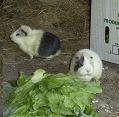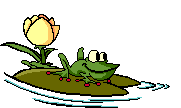|
 Home Home
 What's New? What's New?
 Definition Definition
 Our Design Our Design
 Techniques Techniques
 Articles Articles
 Blog Blog
 About Us About Us
 Year Planner Year Planner
 Resources Resources
 Links Links

Like us on
FaceBook!

Link to this site
|
|
Permaculture Techniques - Biological Control
  Description Description
  Benefits Benefits
  Procedure Procedure
  Natural Pest Controllers Natural Pest Controllers
Description
Combines the practices of species diversity, companion planting, hygienic practice, organic gardening, interplanting and crop rotation, predacious insects and birds, with using specific resistant plant species and cultivars, antagonistic organisms, and site adapted species, to obtain a healthy system.
Benefits
- No residues of harmful synthetic chemicals.
- No use of toxic chemicals (encouraging safe practices and discouraging the manufacture of toxic chemicals, reducing pollution).
- Strong, healthy growth of plants with increased yields.
- Decrease in plant susceptibility to diseases or pests.
- Increase in resistant and hardy strains of plants, genetic strength.
- General improvement in soil "health" (promotes increase in beneficial soil organisms).
- Encourages diversity.
- Cost savings.
Procedure
- Consider prevention of problems first by understanding the nature of the plants in the system and by correct siting of plants.
- Discuss with local gardeners to discover prevalent problems and possible workable solutions.
- Use a quarantine area when introducing materials (including plants) into the system.
- Check for signs of disease, pests, etc.
- Where problems persist after employing techniques such as companion planting, crop rotation, and hygienic practice, try introducing "soft" methods of control - attracting birds and predatory insects, accepted organic dusts or sprays (for prevention or control).
- Physical removal of pest or infected material.
- Use of traps for pests.
- Decrease causes of plant stress - lack of water, light, nutrients, shelter, soil micro-organisms, thus making them more resistant to pests and disease.
- For really persistent problems employ bug juice, proprietary organic sprays, home made organic pesticide concoctions, introduction of specific antagonistic organisms (eg Dipel).
- Research similar approaches to animal husbandry and apply.
Natural Pest Controllers
Nature has its own ways of keeping pests and diseases down to reasonable levels. Simply put, diseases and pests also have pests and diseases too, which keep their numbers down. All we need to do is to help these natural controllers in their work. One way of doing this is to grow flowers to provide pollen and nectar for beneficial, pest and disease eating, insects, such as hoverflies and lacewings.There's a whole list of easy-to-grow annuals which both you, and the beneficial insects, can enjoy. Grow them all over the garden or allotment - to help keep flowers, fruit and vegetables healthy. Sow some today!
- Poached Egg Plant
- Buckwheat Fagopyron esculentum
- Californian poppy Eschscholtzia californica
- Candytuft Iberis amara
- Convolvulus, annual Convolvulus tricolor
- Corn chamomile Anthemis arvensis
- Corn marigold Chrysanthemum segetum
- Cornflower Centaurea cyanus
- Dill Anethum graveolens
- Sunflower
- French marigold Tagetes patula; Tagetes signata
- Golden marguerite Anthemis tinctoria
- Nemophila Nemophila spp
- Phacelia Phacelia tanacetifolia
- Poached egg plant Limnanthes douglassi
- Pot marigold Calendula officinalis
- Sunflower Helianthus annuus
- Sweet alyssum Lobularia maritima
|
|

Our ever-changing view!
Moonset ~ Roll Cloud ~ Sunset
|
permaculture ethics |
care for earth,
care for people,
return surplus,
reduce consumption |
 |
|
Recently Added Pages
Hot Links!

Bookworm is currently reading...
This site is sponsored by
ALWAYS LEARNING BOOKS
Publishers of Australian
books on Home Education.
  The Educating Parent The Educating Parent
  Beverley's other websites Beverley's other websites
|





